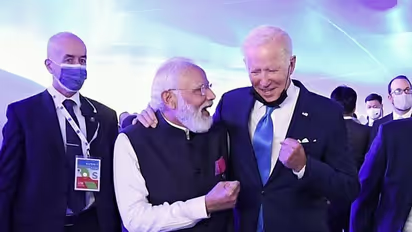How India benefits from G-20 move to stop MNCs from sheltering profits in tax havens

Synopsis
India alone incurs a loss of $10.31 billion in taxes every year to global tax abuse.
The decision taken by leaders of the world's 20 wealthiest economies with regards to endorsing a minimum corporate tax of 15 per cent at the G-20 Leaders’ Summit in Rome is being considered as a significant step towards curbing tax avoidance by multinationals that shift profits abroad. This was a victory of sorts for United States President Joe Biden, who has found it easier to sell the minimum corporate tax to the world than to his own party in the US Congress.
Prior to this, the G-7 had in June agreed to impose higher global taxation on large multinational companies by agreeing to back a minimum global corporation tax of 15 per cent on global profits. According to a February 2021 report submitted by the United Nations high-level panel on financial accountability, transparency and integrity, countries lose $500-600 billion in taxes due to profit shifting practices. India alone incurs a loss of $10.31 billion in taxes every year to global tax abuse.
In India, there have been reports that Indian politicians, cricketers and businessmen stashed their monies abroad in tax havens to evade Indian tax authorities. Let us take a look at a few cases where the companies and individuals evaded and avoided taxes:
* In 1992, multinational companies Vodafone and Hutchison allegedly evaded tax payments in India by making transactions with shell companies registered in tax haven countries, including the Cayman Islands.
* In 2011, the UPA-led government received the names of 782 Indians who had accounts with HSBC. However, no names have been revealed so far, citing privacy concerns.
* In a May 2012 White Paper on black money in India, Swiss National Bank estimated that the total amount of deposits in all Swiss banks, at the end of 2010 by Indian citizens were worth CHF 1.95 billion or $2.1 billion.
* In 2015, secret documents leaked from HSBC's private bank in Switzerland disclosed that it helped about 1200 Indians to evade taxes. The names revealed included top business tycoons, diamond traders, politicians and NRIs. The amount, which was held in this bank, was reportedly to the tune of $4 billion.
* In 2016 came the Panama Papers scandal, which reportedly was the largest-ever leak of information on black money to date. The list of names exposed in the scandal included 500 Indians who violated the countries tax rules and regulations.
* In 2021, more than 380 Indians were named in the Pandora Papers leak case. The Finance Ministry took note of it and initiated an investigation into the matter.
Steps India took to curb black money
Taming the black money was one of the promises the BJP made ahead of the 2014 general elections. The first Cabinet decision that the Narendra Modi government after coming into power in 2014 was the formation of a Special Investigation Team on black money.
In 2016, the government asked individuals to reveal their black money. The scheme went on for four months. In November 2016, the prime minister announced a complete ban on usage of larger currency, including Rs 500 and Rs 1000, which helped in curbing corruption, insurgency and terrorism. In 2016, the Modi government signed the Double Taxation Avoidance Agreement with Mauritius and in 2017, implemented Anti-Avoidance Rules.
The Mauritius route is considered as one of the biggest routes for money laundering and sources of black money generation. The government can now tax capital gains from the sale or transfer of shares of an Indian company acquired by a Mauritian tax resident. In 2016 itself, the government inked a deal with the Swiss National Bank to get account details of Indians with the Indian government. In order to limit the practices of base erosion and profit shifting, the Organisation for Economic Co-operation and Development introduced a set of action plans, which the Indian government has also adopted.
These action plans include digital economy, hybrid, controlled foreign companies, interest deduction, harmful tax practices, prevention of treaty abuse, among others. It is pertinent to mention here that the minimum 15 per cent corporate tax, which was agreed upon by the G-20 leaders, is also a part of the OECD deal.
Also Read
Bank Holidays in November 2021: Banks to be shut for 17 days this month; Details inside
'Alarmingly frequent': Airtel CEO writes a letter, warns users about cyber-fraud cases
Stay updated with all the latest Business News, including market trends, Share Market News, stock updates, taxation, IPOs, banking, finance, real estate, savings, and investments. Track daily Gold Price changes, updates on DA Hike, and the latest developments on the 8th Pay Commission. Get in-depth analysis, expert opinions, and real-time updates to make informed financial decisions. Download the Asianet News Official App from the Android Play Store and iPhone App Store to stay ahead in business.